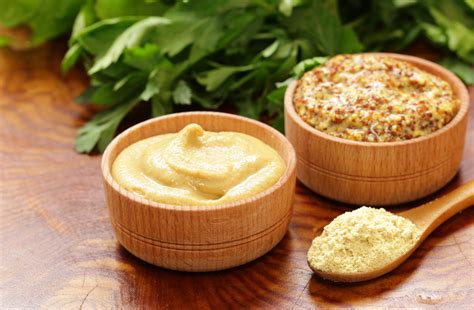Mustard is a popular condiment used in various cuisines around the world. It's a common ingredient in many recipes, from hot dogs and burgers to salad dressings and marinades. However, with the growing awareness of gluten-related disorders, many people are wondering: is mustard gluten-free?
Gluten is a protein found in certain grains, such as wheat, barley, and rye. It's a common allergen that can cause adverse reactions in individuals with celiac disease, non-celiac gluten sensitivity, or wheat allergy. As a result, people with gluten intolerance or sensitivity often need to avoid foods that contain gluten.
Mustard is typically made from mustard seeds, which are naturally gluten-free. Mustard seeds are derived from the mustard plant, a member of the Brassicaceae family. The seeds are harvested, processed, and ground into a fine powder or paste to create mustard.
However, some types of mustard may contain gluten due to added ingredients or cross-contamination during processing. For example:
- Some mustard brands may use gluten-containing ingredients, such as wheat flour or barley malt, as thickeners or fillers.
- Mustard may be processed in facilities that also handle gluten-containing grains, increasing the risk of cross-contamination.

To ensure that your mustard is gluten-free, it's essential to check the ingredient label or contact the manufacturer. Look for certifications like the Gluten-Free Certification Organization (GFCO) or the Celiac Support Association (CSA), which guarantee that the product meets gluten-free standards.
Some popular brands of gluten-free mustard include:
- French's Mustard: This well-known brand offers a range of gluten-free mustard products, including yellow mustard and Dijon mustard.
- Heinz Mustard: Heinz offers a variety of gluten-free mustard products, including organic and non-organic options.
- Annie's Naturals: This brand specializes in organic and natural condiments, including a range of gluten-free mustard products.
When shopping for gluten-free mustard, be sure to read the ingredient label carefully. Some ingredients to watch out for include:
- Wheat flour
- Barley malt
- Rye
- Malt vinegar (may contain gluten due to barley)
If you're unsure about the ingredients or gluten-free status of a particular mustard brand, it's always best to err on the side of caution and choose a different product.
In addition to checking the ingredient label, you can also try making your own gluten-free mustard at home. This way, you can control the ingredients and ensure that your mustard is gluten-free.
Here's a simple recipe for homemade gluten-free mustard:
Ingredients:
- 1/2 cup mustard seeds
- 1/4 cup water
- 1/4 cup white vinegar
- 1 tablespoon honey
- 1 teaspoon salt
- 1/2 teaspoon turmeric (optional)
Instructions:
- Grind the mustard seeds in a spice grinder or coffee grinder until they're finely ground.
- In a bowl, whisk together the ground mustard seeds, water, vinegar, honey, salt, and turmeric (if using).
- Transfer the mixture to a jar and store it in the refrigerator.
This homemade gluten-free mustard recipe makes about 1/2 cup of mustard, which you can use in various recipes or as a condiment.
In conclusion, mustard can be a gluten-free condiment, but it's essential to check the ingredient label or contact the manufacturer to ensure that the product meets gluten-free standards. By choosing a gluten-free mustard or making your own at home, you can enjoy this versatile condiment without worrying about gluten.
Benefits of Gluten-Free Mustard
Gluten-free mustard offers several benefits, including:
- Reduced risk of gluten-related disorders: For individuals with celiac disease, non-celiac gluten sensitivity, or wheat allergy, gluten-free mustard is a safe and healthy option.
- Increased versatility: Gluten-free mustard can be used in a variety of recipes, from sauces and marinades to salad dressings and condiments.
- Improved digestion: Some people may experience improved digestion and reduced symptoms of irritable bowel syndrome (IBS) when using gluten-free mustard.

Gluten-Free Mustard Recipes
Here are some delicious gluten-free mustard recipes you can try:
- Gluten-Free Honey Mustard Chicken: Marinate chicken breasts in a mixture of gluten-free mustard, honey, and herbs, then grill or bake until cooked.
- Gluten-Free Mustard BBQ Sauce: Mix gluten-free mustard with ketchup, brown sugar, and spices to create a tasty BBQ sauce.
- Gluten-Free Mustard Deviled Eggs: Add gluten-free mustard to deviled egg filling for a creamy and tangy twist.
These recipes showcase the versatility of gluten-free mustard and offer delicious and healthy options for individuals with gluten intolerance or sensitivity.
Gluten-Free Mustard Brands
Some popular gluten-free mustard brands include:
- French's Mustard
- Heinz Mustard
- Annie's Naturals
- Whole Foods Market
- Trader Joe's
These brands offer a range of gluten-free mustard products, from classic yellow mustard to spicy Dijon mustard.

Conclusion
In conclusion, mustard can be a gluten-free condiment, but it's essential to check the ingredient label or contact the manufacturer to ensure that the product meets gluten-free standards. By choosing a gluten-free mustard or making your own at home, you can enjoy this versatile condiment without worrying about gluten.
We hope this article has provided you with valuable information about gluten-free mustard. If you have any questions or comments, please feel free to share them below.






Is all mustard gluten-free?
+No, not all mustard is gluten-free. Some mustard brands may contain gluten due to added ingredients or cross-contamination during processing.
How do I make gluten-free mustard at home?
+You can make gluten-free mustard at home by grinding mustard seeds and mixing them with water, vinegar, and spices.
What are some popular gluten-free mustard brands?
+Some popular gluten-free mustard brands include French's Mustard, Heinz Mustard, and Annie's Naturals.
